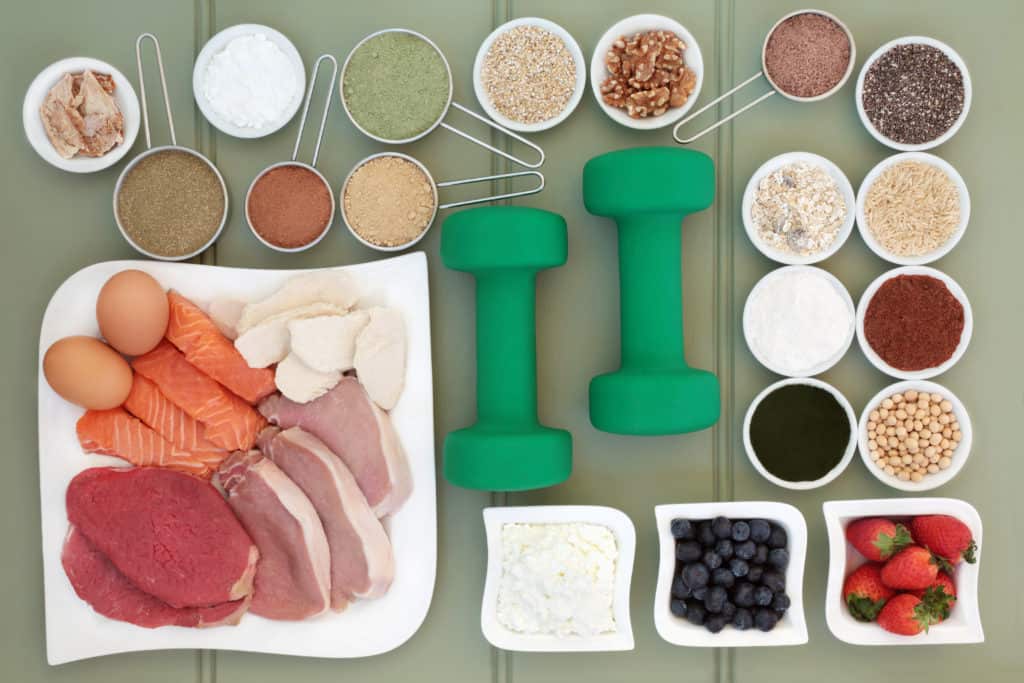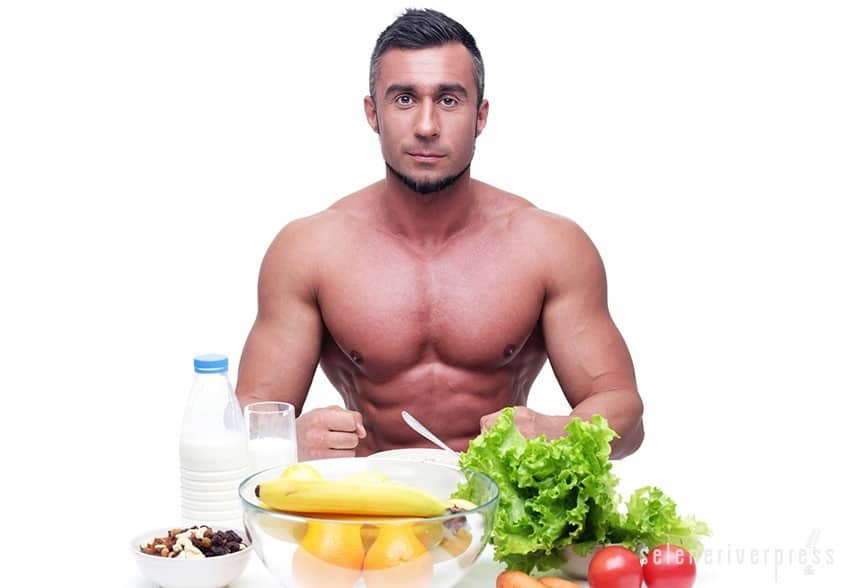If you’re looking for a simple and easy approach to body building nutrition, a whole foods regimen is the perfect solution. Aside from its simplicity, a diet of whole foods offers enormous benefits for your training, bodybuilding, and long-term health.
What Are Whole Foods?
Whole foods are processed and refined as little as possible before you consume them. In other words, they remain in their closest natural form. What we mean by “closest natural form” is that after being hunted, harvested, fished, or farmed, they don’t undergo any further processing. Because of how close these foods are to their natural state, advocates of whole food nutrition often refer to them as “real food.”
As a rule of thumb, if it’s fresh, in season, and organically grown, and if it hasn’t been over-processed or refined of nutrients, it can be considered a whole food. Examples include:
- Fresh fruits and vegetables
- Fresh meats and eggs
- Fresh fish and shellfish
- Whole grains (brown rice, barley, whole wheat, and quinoa)
- Nuts and legumes
- Dairy products (with no added sugars, sweeteners, or flavorings)
What Makes Whole Foods a Better Choice?
To understand what makes whole foods a better alternative for your health, it helps to know what happens to food that’s been processed.
Foods are generally processed in five ways: over-cooking, drying at prolonged high temperatures, irradiation, freezing, and adding chemicals such as preservatives, synthetic vitamins, and pesticides, herbicides, hormones, etc. (to help food grow). When a food is processed in any of these ways, some (if not all) of the vitamins, minerals, and other nutrients that our bodies need are lost. The only thing that remains are calories and minimal amounts of nutrients. In other words, we’re left with empty calories.
If processing strips our food of so many important nutrients, you might be wondering why we started processing it at all. The answer has to do with our need to preserve food in order to store and eat it later. But at some point along the way, we also started processing food to make it taste, look, and feel more appetizing.
However, it’s important to keep in mind that not all processed foods are equally bad. You can still cook, freeze, and dry your food. So long as you’re not cooking it beyond the required temperature, it will retain most of its beneficial nutrients.
How Are Processed Foods Harmful to Your Health?
The danger that processed foods pose to our health doesn’t end at the lack of nutrients. Processing also includes the use of additives such as sugars, sulfites, hydrogenated oils, and nitrates, among others. Some of these substances can harm your health, and studies have even shown that the long-term effects of a diet consisting of mostly processed food increase the likelihood of hormonal imbalance and chronic diseases even as they decrease athletic performance.
Despite these negative effects, our consumption of ultra-processed foods and added sugars is only increasing. Although sugar can be a good source of energy for your workout session, prolonged periods of high sugar consumption can lead to insulin insensitivity, which in turn can lead to irregular blood sugar levels, increased visceral fat, and eventually diabetes. To make things worse, high sugar consumption can dramatically decrease testosterone levels, leading to fat gain and loss of muscle mass and strength.
How Can Whole Foods Boost Performance?
Combining bodybuilding with a regimen of whole food nutrition isn’t a new thing. Vince Gironda, the legendary bodybuilding trainer behind Arnold Schwarzenegger and Larry Scott, implemented a similar regimen for his athletes. His meal plan consisted of raw eggs, fresh meat, leafy vegetables, cottage cheese, and heavy cream—with no frying, dehydrating, or drying, which would decrease the nutritional quality. The meals were minimally processed and uncomplicated, so they were fast and easy enough for anyone to prepare. It may seem basic, but it gave the athletes everything they needed to build their physiques.
Since whole food hasn’t been stripped of any essential nutrients, you get more out of the calories you consume. You get important nutrients and phytochemicals, which boost your performance during training, improve your recovery, build your muscles, and increase your strength. You also get more fiber, which is important in removing toxins and excess hormones from your body. More importantly, you get the essential nutrients your different organs and tissues need to operate at their peak performance.
How Should You Shop for Whole Foods Nutrition?
Shopping for whole foods is easy because you can find them in your local supermarket. Simply look for the sections that contain fresh meats, vegetables and fruit, whole grains, seeds, and nuts. However, you still have to consider the quality of the food that you’re buying. Some produce considered “whole” can still have detrimental effects on your health and bodybuilding endeavors.
In order to avoid the perils of insufficient nutrition, you must focus on balanced and holistic meal plans. You also need to remain conscious of the carbohydrates, protein, and fat you consume. But with the right knowledge, you can easily get the appropriate macronutrients that your body and physique require. Here are some of the best sources of carbohydrates, proteins, fat, and fiber you should include in your shopping list:
Carbohydrates – Fruit, sweet potatoes, potatoes, quinoa, and brown rice are all excellent whole food sources of carbohydrates. They’re rich in micronutrients such as manganese, magnesium, iron, and phosphorous. They’re also high in fiber, so you don’t need to worry about a spike in your blood sugar and the eventual crash right after. (As previously mentioned, fiber is also great for detoxifying your body and balancing your hormones.)
Protein – The best way to get your fix of protein is to consume fresh meat, eggs, and fish (for meat and dairy, go for organic, pasture-raised products whenever possible). If you’re looking for vegan options, beans and lentils are a good way to go. For liquid protein, try full-fat dairy milk (if possible, raw). Cashew or almond milk are good vegan options.
Unfortunately, the modern diet typically offers an insubstantial amount of the protein known as collagen. This is crucial for joint health, and if you don’t get a lot of protein in your diet, you should consider collagen supplements. (As an added bonus, it may also help you look and feel young.)
Fats – You can get the fats, oils, and fatty acids your body needs from olives, nuts, seeds, avocadoes, raw milk, full-fat and cultured dairy products, and almond or cashew milk.
Fiber – Aside from whole carbohydrates, you can get a good amount of fiber from vegetables (especially green leafy ones) and fruits. These also contain numerous micronutrients and antioxidants your body needs to protect and repair itself from training and other day-to-day activities.
Go for Organic
Whole foods aren’t exempt from exposure to harmful chemicals. For economic reasons, chemical fertilizers, feeds, and pesticides can be used to keep production costs low and disease or pest free. However, these chemicals have harmful effects on our body as they can mess with our hormonal balance. The solution is to opt for organic produce and natural methods of growing both vegetables and animals. Being a bodybuilder makes it even more important to avoid chemically laden food products as they can mess up your body composition.
Go for Non-GMO Produce
Some fruits, vegetables, and animals have been genetically modified to either create higher yields or immunity from pest and disease. The problem is that GMO crops may be associated with a higher risk of cancer, disruption of normal biological processes, birth defects, mental disease, and inflammation. Examples of GMO produce include corn, canola, soy, cotton, beets, papaya, alfalfa, zucchini, and potatoes, and the best way to ensure these foods are non-GMO is to buy the certified organic versions.
Following a whole foods diet gives you a simple and easy approach for your bodybuilding nutrition. Aside from avoiding the perils of processed food, you can ensure that you’re benefiting from the quality nutrition that only comes from real food. In addition, you’ll have more time for rest and training as a whole foods meal plan is simple and easy to prepare.
Images from iStock/DeanDrobot (main image), marilyna (post image).


